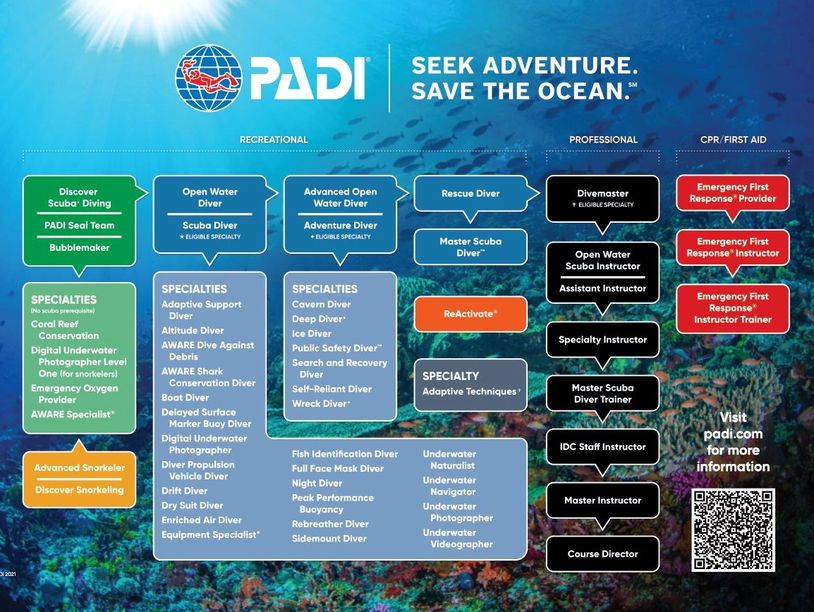Discover the magic of the ocean with Subtidal Diving
Scuba Diving Training

PADI scuba diving training courses on offer from beginner to professional qualifications.
Core Courses
Discover Scuba Diving
Advanced Open Water Diver
Discover Scuba Diving
This is an introductory experience for beginners to try scuba diving under professional supervision in a safe environment like a swimming pool. It is not a certification, but it allows you to learn basic skills, breathe underwater, and use equipment before committing to a full certification course like the PADI Open Water Diver course.
Open Water Diver
Advanced Open Water Diver
Discover Scuba Diving
Learn about scuba diving principles and terminology (either in-person or online), then learn basic scuba skills in a pool (or pool-like environment) with a highly trained PADI Instructor. When you're ready, make four dives in an open water environment (the sea or a lake) with your instructor supporting you every step of the way.
Advanced Open Water Diver
Advanced Open Water Diver
Advanced Open Water Diver
Learn about underwater navigation, deep diving and three types of specialty diving that interest you. After some skill practice with your instructor, you'll make five open water dives.
Rescue Diver
Rescue Diver
Advanced Open Water Diver
Learn how to think like a rescue diver through home study and skill practice with an instructor. All PADI courses are flexible and performance-based. You'll practice basic rescue skills and then show you can effectively apply them in open water.
Divemaster
Rescue Diver
Divemaster
Learn how to lead underwater tours, assist with scuba classes and inspire others to care about the ocean.
PADI Divemaster is the most popular and most recognized professional scuba certification in the world. PADI Divemasters enjoy abundant career opportunities, get paid to scuba dive and share their love for the ocean.
ReActivate
Rescue Diver
Divemaster
ReActivate is the engaging, efficient way to refresh your dive knowledge and scuba skills. Move quickly through topics you know well, dive deeper on topics where your knowledge may have lapsed.
Specialty Courses
Dry Suit Diver Specialty
Peak Performance Buoyancy Specialty
Peak Performance Buoyancy Specialty
Unlike wetsuits, drysuits are filled with air. During your drysuit course, your instructor will teach you how to control the air in your drysuit along with your buoyancy.
You'll also learn about different types of drysuits, basic drysuit repairs and maintenance.
Peak Performance Buoyancy Specialty
Peak Performance Buoyancy Specialty
Peak Performance Buoyancy Specialty
Buoyancy control is essential to becoming a confident, relaxed diver. Being perfectly balanced allows you to float effortlessly, use air more efficiently and deftly approach marine life to get a closer look. Essential skills for scientific diving!
Dive Against Debris Specialty
Peak Performance Buoyancy Specialty
Coral Reef Conservation Specialty
Complete Dive Against Debris eLearning, then make a Dive Against Debris survey dive, during which you’ll collect marine debris underwater. After your dive, you’ll weigh, sort, record, dispose of and report your marine debris to the PADI AWARE Foundation™ database.
Coral Reef Conservation Specialty
Coral Reef Conservation Specialty
Coral Reef Conservation Specialty
This course helps you appreciate the complexity of coral reef habitats and teaches how you can help conserve these vital systems. Anyone who has an interest in the aquatic world can take this course. There are no prerequisites or age restrictions and no water sessions are required to earn this non-diving certification.
PADI AWARE Specialty
Coral Reef Conservation Specialty
Emergency First Response
Make a difference for yourself and others by learning and applying tips to save the ocean. The PADI AWARE Specialty course equips you with tangible actions and opportunities to bring about positive ocean change.
Supported by PADI eLearning®, this course dismantles the barriers between diving and conservation, making responsible marine conservation accessible to all.
Emergency First Response
Coral Reef Conservation Specialty
Emergency First Response
What will you learn?
Primary Care (CPR) – the steps and
techniques for handling life-threatening
emergencies.
Secondary Care (First Aid) – how to provide first aid that eases pain and reduces the risk of further harm in situations which are not life-threatening.
Care for Children – learn how to respond to emergencies involving children and infants.
CPR & AED – how to deliver CPR and use an AED (automated external defibrillator).
First Aid at Work – These programs
include additional topics and skills to meet
requirements set by government regulations while following the easy to learn EFR approach to training.
EFR Refresher – refresh your CPR and first aid skills every 24 months
